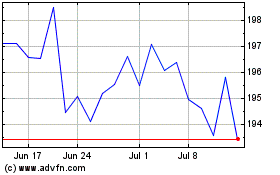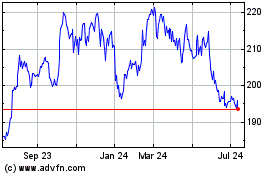INTERVIEW: Mexican Exchange Preps For Derivatives Market Revamp
October 21 2011 - 3:21PM
Dow Jones News
Mexico's main exchange operator is developing a new
clearinghouse and trading platform that will service the country's
swaps market, aimed to get a jump on planned regulations, according
to the company's chief executive.
The market revamp, seen modeled on the U.S. Dodd-Frank financial
law, opens up a new swath of Mexico's derivatives market for the
Bolsa Mexicana De Valores (BOLSA.MX) and could deepen the firm's
ties with Chicago-based exchange company CME Group Inc. (CME).
"It's clearly in the exchange's interest to be able to
participate fully in the new institutional framework that is going
to be built up," said Luis Tellez, president of Mexico City-based
BMV, in an interview.
"We are preparing ourselves and already have done much of the
electronics [work] that need to be done in terms of the
clearinghouse," he said.
The U.S. is pressing ahead with rules called for by the
Dodd-Frank act, which more tightly regulates trade in products like
credit derivatives and interest-rate swaps. Such derivatives
contracts, traded off-exchange in a market dominated by dealer
banks, caught blame for worsening the credit crisis in 2008 because
the market proved difficult for regulators to monitor for big
risks.
Europe simultaneously is developing its own rules set, and
Mexico aims to follow suit, alongside other nations like Japan,
Singapore, Korea and South Africa.
Exchanges stand to capture new business by applying their
methods for trading futures and stock-options to more complex
instruments like swaps and forwards.
BMV is developing a separate clearinghouse to handle the
business, Tellez said, which will house collateral posted against
outstanding trades in over-the-counter derivatives. The firm is
using a risk-management system developed by Algorithmics Inc. and
may leverage its relationship with CME, which owns a 1.9% stake in
BMV and has teamed with the Mexican exchange group to broaden
access to both companies' futures markets.
"There is the possibility of a joint venture on the
clearinghouse, but we haven't decided," Tellez said.
The size of Mexico's market in over-the-counter derivatives runs
about three times larger than the share- and futures trading now
done at BMV, Tellez said. Interest-rate swaps, used by banks and
municipalities to hedge mortgage exposure and bond issues, make up
about 60% of the instruments traded, according to a report by the
Financial Stability Board.
Tellez said that BMV is in talks with Mexico's securities market
regulator and central bank as authorities form up new guidelines
for the products.
"I believe something will come out on it very soon," he said,
and next summer's meeting of the G20 nations in Mexico looms as a
key date to show progress. The world's top 20 economies agreed two
years ago to direct off-exchange derivatives transactions toward
clearinghouses, which guarantee trades, and strengthen reporting
practices.
If BMV can capture half of the revenue to be generated by
clearing trades in over-the-counter derivatives and one-quarter of
the fees that will come from executing transactions, the firm
stands to make an additional 1.1 billion pesos ($80.4 million) in
revenue, according to analysis by Equity Research Desk.
Some of that business may come as U.S. authorities complete
Dodd-Frank rulemaking, and derivatives dealer banks decide it's
cheaper to shift some of their Mexico-related swaps business to
Mexico City from New York, said Bernardo Mariano, analyst with
Equity Research Desk.
"It could be an opportunity to repatriate some of that
business," he said.
-By Jacob Bunge, Dow Jones Newswires; 312 750 4117;
jacob.bunge@dowjones.com
CME (NASDAQ:CME)
Historical Stock Chart
From May 2024 to Jun 2024

CME (NASDAQ:CME)
Historical Stock Chart
From Jun 2023 to Jun 2024
